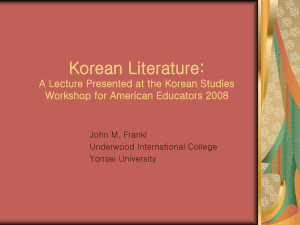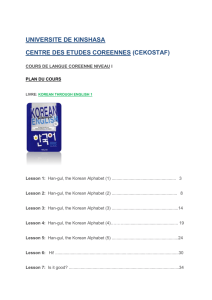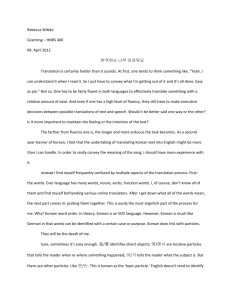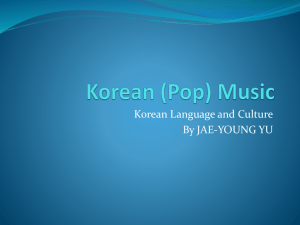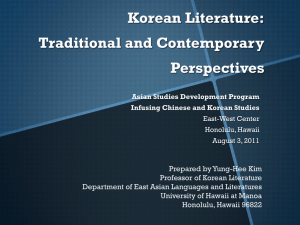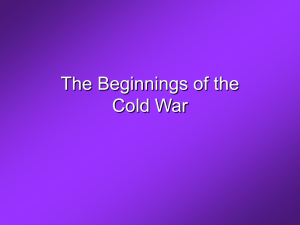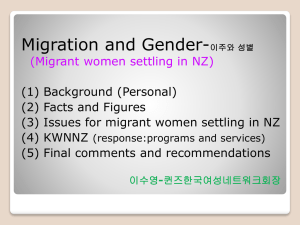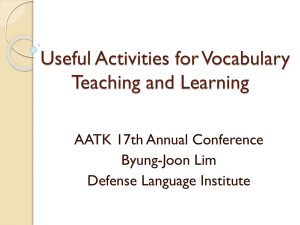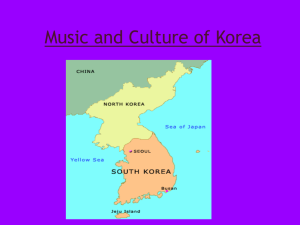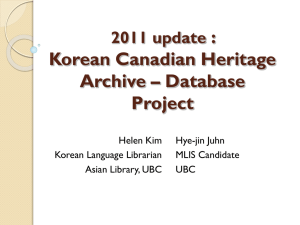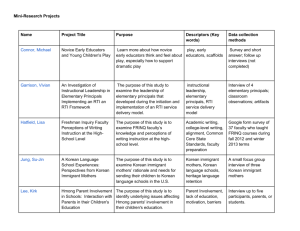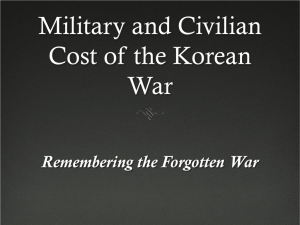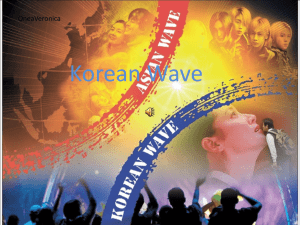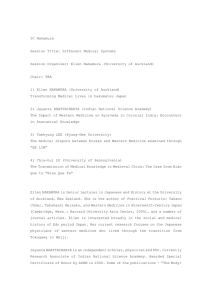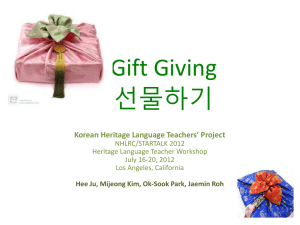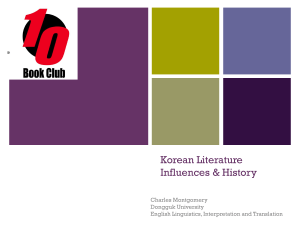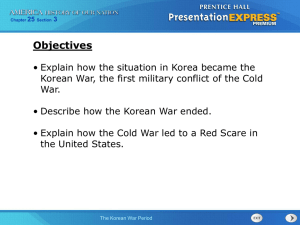File
advertisement
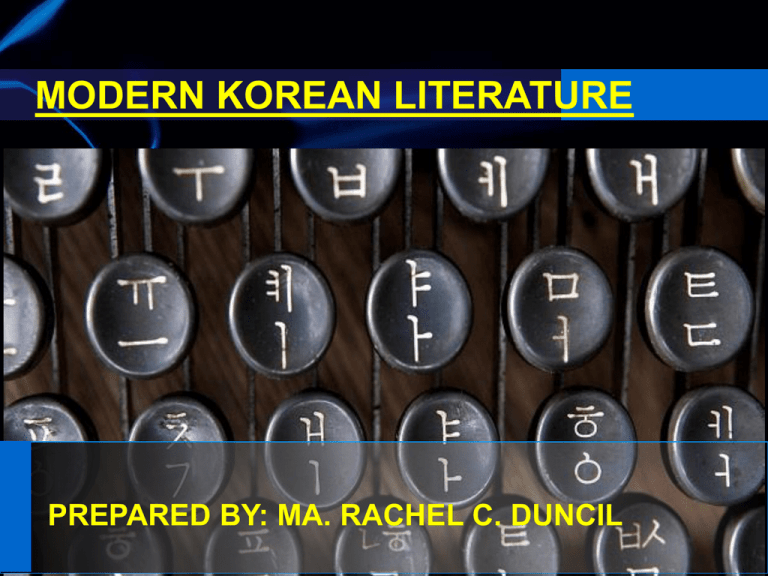
MODERN KOREAN LITERATURE PREPARED BY: MA. RACHEL C. DUNCIL BEGINNING OF MODERN KOREAN LITERATURE Formed against the background of the crumbling political society of the Choson Dynasty. The importation of new ideas from the West. The new political reality of rising Japanese imperial power in East Asia. ENLIGHTENMENT PERIOD (kaehwa kyemong) The change from traditional to modern literature was largely due to the effects of the New Education and the Korean Language and Literature movement. NEWLY EMERGED MEDIA • Tongnip Shinmun (The Independent) • Cheguk Shinmun (Imperial Newspaper) • Hwangsong Shinmun (The Imperial City Newspaper) • Mansebo (The Forever Report) • Taehan maeil Shinbo (Korean Daily News) • Taehan minbo (The Korean People's Report) NEW POETIC FORMS • Ch'angga (new type of • Hae egeso sonyon song) ege (From the Sea to the Youth, 1908). • Shinch'eshi (new poetry) • Kkot tugo (Laying Down the Flowers • Chayushi (free verse poem) • T'aebaeksan shi (Poems of Mt. T'aebaeksan) BIOGRAPICAL WORKS Aeguk puinjon (Tale of the Patriotic Lady) Chang Ji-yon, 1907) Elchi Mundok (Shin Ch'ae-ho, 1908) Kuk-son's Kumsu hoeuirok (Notes From the Meeting of the Birds and Beasts) (1908) A new literary form called the shinsosol (new novel) secured a popular readership base. SHINSOSOL BASED LITERARY WORKS • Yi In-jik's Hyoluinu (Tears of Blood) (1906) • Ensegye (The Silver World) (1908) • Yi Hae-cho's Kumagom (The Demon-Ousting Sword) • Chayujong (The Freedom Bell) • Ch'oe Ch'an-shik's Ch'uwolsaek (The Color of the Autumn Moon) (1912) JAPANESE COLONIAL PERIOD 1910-1945 EMERGENCE OF MAGAZINES • Ch'angjo (Creation) (1919) • P'yeho (The Ruins) (1920) • Paekcho (White Tide) (1922) • Kaebyok (The Opening) (1920) • Dong-A Ilbo and the Chosun Ilbo In the early 1920s, the base support for Korea's modern literature began to expand as people experienced a renewed self-awakening and recognition of their national predicaments in the wake of the March 1919 uprising. JAPANESE COLONIAL LITERARY WORKS • Yi Kwang-su's short story Sonyonui piae (The Sorrow of Youth) • Mujong (Heartlessness) (1917) • Paettaragi (Following the Boat) (1921) • Kamja (Potatoes) (1925) • Hyon Chin-gon's Unsu choun nal (The Lucky Day) (1924) • Yom Sang-sop's P'yobonshilui ch'nonggaeguri (Green Frog in the Specimen Gallery, 1921) • Mansejon (The Tale of Forever) (1924) FRENCH TECHNIQUE (vers libre) • Chu Yo-han's Pullori (Fireworks) (1919) • Kim So-wol's poetry collection Chindallae kkot (Azaleas) (1925) • Yi Sang-hwa (Madonna) • Ppaeatkin Turedo pomun onun-ga (Does Spring Come to Those Who Have Been Plundered?) • Han Yong-un, Nimui ch'immuk (Thy Silence) (1926) Literature of the Period of National Division The Korean War(1950-1953) was a tragic interim which solidified Korea's division into South and North. Postwar Korean society's emergence from the wounds and chaos of that war had a considerable impact on the development of Korean literature. NATIONAL DIVISION LIT. WORKS • An Su-kil, Pukkando (1959) • Oh Sang-won's Moban (Revolt) (1957) • Son Ch'ang-sop's Injo in-gan (Artificial Man) (1958). • Pak Kyong-ri's Pulshin shidae (The Age of Mistrust) (1957) • Chong Kwang-yong's Kkoppittan Li (Captain Lee) (1962) • Yi Bom-son's Obalt'an (A Bullet Misfired) • Yi Ho-ch'iol's Nasang (The Nude Portrait) (1957) • Ch'oe Sang-gyu's P'oint'du (Point) (1956) The Translation of Korean Literature in Foreign Languages Korean literature was largely unknown to the world until the 1980s, when translations of Korean literary works began to appear in foreign countries. Since then, the types of works selected for translation have become increasingly diverse, and the quality of the translations themselves have improved steadily. TRANSLATED KOREAN LITERATURE • Flowers of Fire (Peter H. Lee, University of Hawaii Press, 1974) • Land of Exile (Marshall R. Pihl and Bruce Fulton, New York: M.E.Sharpe, 1993) • Hwang's novel Umjiginun song (The Moving Castle) translated in the United States by Bruce Fulton. • Elhwa (Eulhwa, The Shaman Sorceress), Munyodo (The Portrait of the Shaman) have been translated and published. • Yi Mun-yol's Uridurui ilgurojin yongung (Notre Heros Defigure) and Shiin (Le Poete) • Cho Se-hui's Nanjang-iga ssoa ollin chagun kong (La petite Balle Lancee par un Nain)
